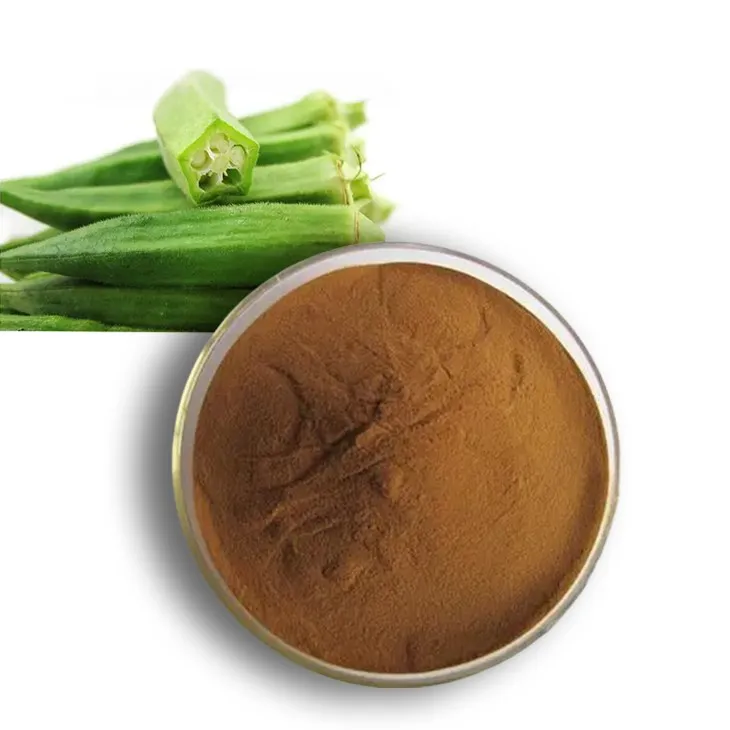- 0086-571-85302990
- sales@greenskybio.com
Caution and Care: Potential Side Effects and Precautions with Okra Extract
2024-07-04

1. Introduction
Okra Extract has gained popularity in recent years due to its purported health benefits. It is rich in nutrients such as vitamins, minerals, and antioxidants. However, like any natural or processed substance, it is not without potential risks. Understanding these side effects and taking appropriate precautions is crucial for those who wish to use Okra Extract safely.

2. Potential Side Effects of Okra Extract
2.1 Gastrointestinal Disturbances
One of the most common side effects associated with okra extract is gastrointestinal disturbances.
- Nausea: Some individuals may experience feelings of nausea after consuming okra extract. This could be due to the body's reaction to certain compounds present in the extract. For example, the high fiber content in okra can sometimes cause an upset stomach, leading to nausea.
- Diarrhea: Okra extract might also cause diarrhea in some people. The fiber and other substances in okra can affect the digestive system's normal functioning. If the body is not used to the high fiber intake from the extract, it can result in loose stools.
- Abdominal Cramps: Abdominal cramps are another possible side effect. The extract may stimulate the intestines in a way that causes involuntary muscle contractions, leading to cramps. This can be particularly uncomfortable and may interfere with daily activities.
2.2 Allergic Reactions
Allergic reactions to okra extract, although less common, can be quite severe.
- Skin Rash: A skin rash is one of the first signs of an allergic reaction. It can appear as red, itchy patches on the skin. This occurs when the immune system mistakes the components of the okra extract as harmful invaders and mounts an immune response, which manifests as a skin reaction.
- Hives: Hives are raised, itchy welts on the skin. They can be small or large and may spread over different parts of the body. In some cases, hives can be accompanied by swelling, especially around the face, lips, or tongue.
- Anaphylaxis: In the most severe cases, okra extract can trigger anaphylaxis. This is a life - threatening allergic reaction that affects the whole body. Symptoms include difficulty breathing, rapid heartbeat, dizziness, and a drop in blood pressure. Anaphylaxis requires immediate medical attention.
2.3 Effects on Blood Sugar Levels
Okra extract may have an impact on blood sugar levels.
- Hypoglycemia: For individuals with diabetes who are taking medications to lower blood sugar, okra extract could potentially cause hypoglycemia. This is because okra contains compounds that may enhance the effects of diabetes medications, leading to a drop in blood sugar levels below normal.
- Blood Sugar Fluctuations: Even for non - diabetic individuals, the extract might cause minor fluctuations in blood sugar levels. This can be a concern for those who need to maintain stable blood sugar levels for other health reasons, such as hormonal imbalances.
2.4 Interaction with Medications
Okra extract may interact with certain medications.
- Anticoagulants: If you are taking anticoagulant medications, okra extract could potentially increase the risk of bleeding. Okra contains substances that may affect blood clotting, and when combined with anticoagulants, this effect may be enhanced.
- Digoxin: For individuals taking digoxin, okra extract may interfere with the absorption or effectiveness of the drug. This is because some components in the extract may bind to digoxin or affect its metabolism in the body.

3. Precautions for Different User Groups
3.1 Pregnant and Nursing Women
Pregnant and nursing women should be especially cautious when considering the use of okra extract.
- Lack of Safety Data: There is currently limited safety data regarding the use of okra extract during pregnancy and breastfeeding. Since the safety of the fetus and the nursing infant is of utmost importance, it is advisable to avoid using okra extract without consulting a healthcare provider.
- Possible Effects on Hormones: Okra contains phytoestrogens, which are plant - based compounds that can mimic the effects of estrogen in the body. During pregnancy and breastfeeding, hormonal balance is crucial, and the use of substances containing phytoestrogens may potentially disrupt this balance.
3.2 Children
Children also require special consideration when it comes to okra extract.
- Digestive System Sensitivity: Children's digestive systems are more sensitive than those of adults. The high - fiber content and other substances in okra extract may be more likely to cause gastrointestinal problems in children, such as abdominal pain, diarrhea, or constipation.
- Allergic Reactions: Children are also more prone to developing allergic reactions. Since the prevalence of food allergies in children is relatively high, introducing okra extract should be done with caution, especially if there is a family history of allergies.
3.3 Elderly
The elderly need to take certain precautions when using okra extract.
- Medication Interactions: Elderly individuals are more likely to be taking multiple medications. As mentioned earlier, okra extract can interact with certain medications, so it is important to check for potential interactions before using the extract. This can help prevent adverse effects on health.
- Digestive and Nutritional Considerations: The digestive system of the elderly may be less efficient. The high - fiber content in okra extract may cause digestive discomfort. Additionally, the elderly may have specific nutritional requirements, and the use of okra extract should be balanced with their overall diet to ensure they are getting all the necessary nutrients.
3.4 Individuals with Pre - existing Medical Conditions
People with pre - existing medical conditions should be vigilant when using okra extract.
- Diabetes: As mentioned earlier, okra extract can affect blood sugar levels. For individuals with diabetes, it is crucial to monitor blood sugar closely if using the extract. They should also consult their doctor before starting to use okra extract to ensure it is safe in combination with their existing diabetes treatment.
- Heart Disease: Those with heart disease, especially those taking anticoagulants or digoxin, need to be aware of the potential interactions with okra extract. Any changes in their medication's effectiveness or an increased risk of bleeding can have serious consequences for their health.
- Allergies and Sensitivities: Individuals with known allergies or sensitivities to okra or related plants should obviously avoid using okra extract. Even those with a history of general food allergies may be at a higher risk of developing an allergic reaction to the extract.

4. How to Minimize Risks
While there are potential side effects associated with okra extract, there are steps that can be taken to minimize risks.
- Consult a Healthcare Provider: Before starting to use okra extract, it is essential to consult a healthcare provider. They can assess your individual health status, including any pre - existing medical conditions, medications you are taking, and your overall health goals. Based on this information, they can provide personalized advice on whether okra extract is suitable for you and how to use it safely.
- Start with a Small Dose: If your healthcare provider approves the use of okra extract, it is advisable to start with a small dose. This allows your body to gradually adjust to the extract and helps to identify any potential side effects at an early stage. If no adverse effects are observed, the dose can be gradually increased as needed.
- Monitor for Side Effects: Continuously monitor your body for any signs of side effects. This includes paying attention to any gastrointestinal symptoms, allergic reactions, or changes in blood sugar levels. If you notice any unusual symptoms, stop using the extract immediately and seek medical advice.
- Choose a Reputable Source: When purchasing okra extract, choose a reputable source. This ensures that the extract is of high quality and has been produced under proper manufacturing conditions. Poor - quality extracts may contain contaminants or inaccurate dosages, which can increase the risk of side effects.
5. Conclusion
Okra extract has potential health benefits, but it is not without risks. By understanding the possible side effects and taking appropriate precautions, different user groups can make more informed decisions about whether to use okra extract and how to use it safely. It is always important to prioritize safety and consult a healthcare provider when in doubt. With proper care and attention, the use of okra extract can be a part of a healthy lifestyle for those who can tolerate it without experiencing significant adverse effects.
FAQ:
What are the mild side effects of okra extract?
Mild side effects of okra extract may include gastrointestinal discomfort such as mild nausea, bloating, or a feeling of fullness. Some individuals may also experience mild allergic reactions like skin itching or a minor rash.
Can okra extract cause severe allergic reactions?
Yes, in rare cases, okra extract can cause severe allergic reactions. These may include difficulty breathing, swelling of the face, lips, tongue, or throat, and in extreme cases, anaphylactic shock. People with known allergies to okra or related plants are at higher risk.
Are there any precautions for pregnant women using okra extract?
Pregnant women should be cautious when considering using okra extract. There is limited research on its safety during pregnancy. It is advisable to consult a healthcare provider before use to avoid any potential risks to the fetus.
What precautions should diabetic patients take when using okra extract?
Diabetic patients should monitor their blood sugar levels closely when using okra extract. Although okra may have some potential benefits for blood sugar control, it could also interact with diabetes medications. They should inform their doctor about its use to ensure proper management of their condition.
How should people with a history of kidney problems approach the use of okra extract?
People with a history of kidney problems should use okra extract with great caution. Okra contains certain substances that may affect kidney function. It is crucial to consult a nephrologist or a healthcare professional before starting to use okra extract to avoid potential harm to the kidneys.
Related literature
- The Safety Profile of Okra Extract: A Comprehensive Review"
- "Okra Extract: Benefits, Risks, and Precautions - A Clinical Perspective"
- "Potential Side Effects of Herbal Extracts: Focus on Okra"
- ▶ Hesperidin
- ▶ Citrus Bioflavonoids
- ▶ Plant Extract
- ▶ lycopene
- ▶ Diosmin
- ▶ Grape seed extract
- ▶ Sea buckthorn Juice Powder
- ▶ Fruit Juice Powder
- ▶ Hops Extract
- ▶ Artichoke Extract
- ▶ Mushroom extract
- ▶ Astaxanthin
- ▶ Green Tea Extract
- ▶ Curcumin
- ▶ Horse Chestnut Extract
- ▶ Other Product
- ▶ Boswellia Serrata Extract
- ▶ Resveratrol
- ▶ Marigold Extract
- ▶ Grape Leaf Extract
- ▶ New Product
- ▶ Aminolevulinic acid
- ▶ Cranberry Extract
- ▶ Red Yeast Rice
- ▶ Red Wine Extract
-
Milk Thistle Extract
2024-07-04
-
Grape Leaf Extract
2024-07-04
-
Coix Seed Extract
2024-07-04
-
Black Rice Extract
2024-07-04
-
Lemon Juice Powder
2024-07-04
-
Grapefruit Seed Extract Powder
2024-07-04
-
Angelica sinensis extract
2024-07-04
-
Licorice Root Extract Powder
2024-07-04
-
Hawthorn Extract
2024-07-04
-
Sugarcane Extract
2024-07-04





















